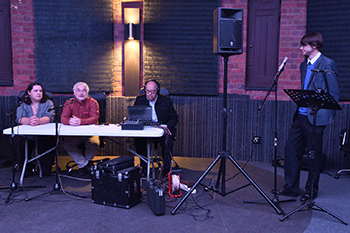Physics Department sheds light on mystery of dark matter through films and radio programme

The screening of The Dark Matter Mystery and Dark
at the Naval Hill Planetarium was followed by a discussion
recorded for the radio programme Sterre en Planete
on RSG. From left are Mariette Erwee, Senior Officer at
the School of Mathematics, Natural Sciences and
Technology Education of the UFS, Prof Matie Hoffman,
Associate Professor at the Physics Department of the UFS,
Hennie Maas, from RSG, and Sakkie van der Westhuizen,
PhD student in astrophysics.
Photo: Mart-Mari Duvenhage
The Physics Department at the University of the Free State (UFS) not only recently educated the local community about the mystery of dark matter, but shared its knowledge with a much wider audience.
The first screening of two planetarium full-dome films, The Dark Matter Mystery and Dark, at the Naval Hill Planetarium were concluded with a recording for the radio programme Sterre en Planete. During the discussion, led by Hennie Maas from RSG radio station, the audience asked questions that were answered by Prof Matie Hoffman, Associate Professor at the department, Sakkie van der Westhuizen, a PhD student in astrophysics, and Mariette Erwee from the School of Mathematics, Natural Sciences and Technology Education. The radio show was broadcast on 18 June at 19:30 on RSG.
Shows screened at special event
According to Prof Hoffman the planetarium hosts a movie premiere whenever pre-rendered shows are screened for the first time. The films shown on 10 June 2017 introduced viewers to the quest for dark matter. “Dark Matter makes up a huge part of the Universe, but it is a great mystery. We know very little about it. We cannot see it, and it is an area of enormous interest to scientists,” Prof Hoffman said.
Films sourced from European Southern Observatory
The event was attended by various stakeholders such as loyal planetarium patrons, UFS colleagues, and those interested in astronomy. The films were sourced from the European Southern Observatory, an organisation that makes planetarium content available online.
The Dark Matter Mystery took the audience on contemporary astrophysics’ biggest quest. They saw why astronomers know dark matter exists. Dark, directed by Peter Morse, is an adventure that goes to the very edges of contemporary cosmology and data visualisation, telling a complex scientific story with a touch of humanity.
The films will be screened at the Naval Hill Planetarium from time to time and those interested can visit Computicket for more info.